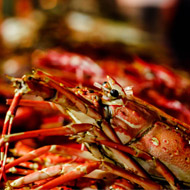Swiss chefs ordered to stun lobsters before boiling

Many scientists and animal welfare organisations argue that the lobster’s nervous system is quite sophisticated.
Chefs in Switzerland will no longer be able to boil lobsters without stunning them first, under new rules introduced by the Swiss Government.
According to The Guardian, the move is part of a wider modernisation of Swiss animal protection laws. From March 1, 2018 the practice of plunging live lobsters into boiling water will no longer be permitted.
The government order read that lobsters 'will now have to be stunned before they are put to death’. Swiss broadcaster RTS said that only electric shock or the ‘mechanical destruction’ of the lobster’s brain will be permitted methods of stunning under the new rule.
Many scientists and animal welfare organisations argue that the lobster’s nervous system is quite sophisticated and that it is likely to feel great pain when boiled alive.
The government of Switzerland also said that the live transport of marine crustaceans on ice will no longer be permitted, insisting instead that they must ‘always be held in their natural environment.’



 The Veterinary Medicines Directorate (VMD) is inviting applications from veterinary students to attend a one-week extramural studies (EMS) placement in July 2026.
The Veterinary Medicines Directorate (VMD) is inviting applications from veterinary students to attend a one-week extramural studies (EMS) placement in July 2026.